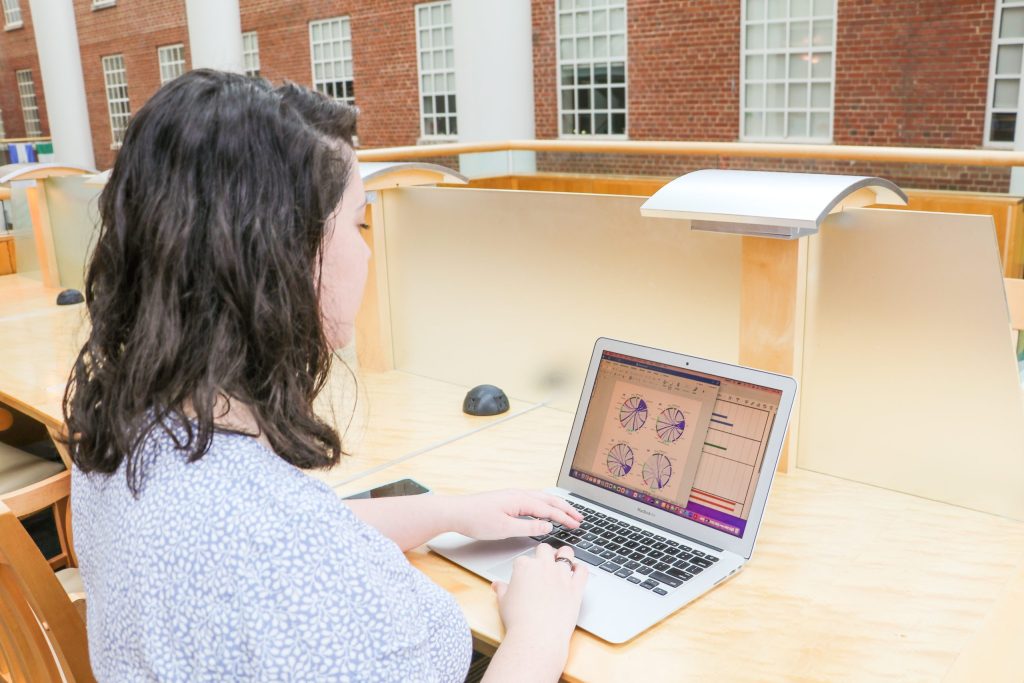Kryston examines sanitation in NC communities with IE’s inaugural Environmental Justice Graduate Research Award
March 3, 2023
Amy Kryston, the inaugural recipient of the UNC Institute for the Environment’s Environmental Justice Graduate Research Award, studies the relationship between on-site sanitation, health and social drivers of health in North Carolina communities.
“Sanitation is a human right,” Kryston, a second-year master of public health student in the Gillings School of Global Public Health, explained. “It’s so intimately tied to the concept of dignity and what makes us human and worthy of respect.”
North Carolina poses many interesting sanitation issues. Nearly 50% of all households rely on septic systems, over twice the national average. Some rural communities in North Carolina even rely on straight pipes to dispose of sewage, which affects both the health of the community and the environment.
Straight pipes are an infrastructure that releases raw sewage from a household or property directly into the surrounding environment without being treated, according to Kryston.
“It can have serious health ramifications because it is untreated sewage out in the environment,” she shared.
Kryston works with Musa Manga and Courtney Woods, both faculty in the Department of Environmental Sciences and Engineering in the Gillings School of Global Public Health.
The three-part research project, which officially began in August, will include a literature review, a qualitative study and a quantitative study.
According to Kryston, the literature review examines on-site sanitation systems and barriers to safe sanitation in the United States by looking at two questions: “why do people lack access to centralized [sanitary] sewers, and why, if they have septic systems or some other form of onsite sanitation, isn’t it safe?”
The review identified roughly 14 barriers to safe sanitation, including socioeconomic status, race-based discrimination and legislation that may impair access. This information will serve as the foundation for the qualitative portion, which Kryston will begin this semester.
The qualitative research will involve interviews with up to 40 community members, policy-makers and utility providers in North Carolina. The interviews will examine people’s experiences with the previously identified barriers to safe sanitation.
The quantitative portion of the project will involve looking at NC DETECT data, over 10 years of data from emergency departments in North Carolina. NC DETECT, or the North Carolina Disease Event Tracking and Epidemiologic Collection Tool, is managed by the North Carolina Division of Public Health and the UNC School of Medicine. The data will be compared to reports of septic system malfunctions throughout the state to examine the association between on-site sanitation use and acute gastrointestinal illness.
However, the data does have some limitations.
It’s expected that “only people with a severe gastrointestinal illness go to the ER, so it’s not a fully holistic reporting of the frequency of gastrointestinal illness,” according to Kryston.
Nonetheless, the data will provide useful information for the project.
“We’ll be able to hopefully see if there’s a correlation between the number of septic system malfunctions and the incidence of acute gastrointestinal illness,” Kryston explained.
Kryston received her bachelor’s degree in civil engineering with a concentration in water resources from Gonzaga University. She worked as an engineer for both the federal government and a municipal government before receiving her Master’s in Civil and Environmental Engineering and Earth Sciences from the University of Notre Dame.
Although she previously focused on water policy research, Kryston became interested in sanitation in humanitarian settings, such as refugee camps, and sanitation’s relation to human dignity while working with the UNC Humanitarian Health Initiative.
Through her work with the Environmental Justice Action Research Clinic in Gillings, Kryston learned about the prevalence of water and sanitation concerns in communities across North Carolina and began thinking about safe sanitation in the United States.
“I think the way that we enforce different codes relating to clean water and sanitation can really further marginalize already marginalized and people living in poverty,” Kryston shared.
She hopes that this project can provide insights for future work and advocacy for safe sanitation in other parts of the United States.
The Environmental Justice Graduate Research Award provides an annual stipend and is awarded to a UNC graduate student who can demonstrate a research plan that broadens understanding of environmental justice issues in marginalized communities in North Carolina. The recipient must conduct research using methods that can be modeled for use beyond the state and is encouraged to partner with other disciplines and communities in their project.
Story by Natalie Peoples
Natalie Peoples is a student at UNC-Chapel Hill. Natalie is currently a sophomore from Kensington, Maryland, pursuing a double major in journalism and environmental science. In addition to her work as a communications intern for the Institute for the Environment, she has experience in photojournalism and environmental research. Natalie plans to pursue a career in environmental journalism with a special interest in marine science.

